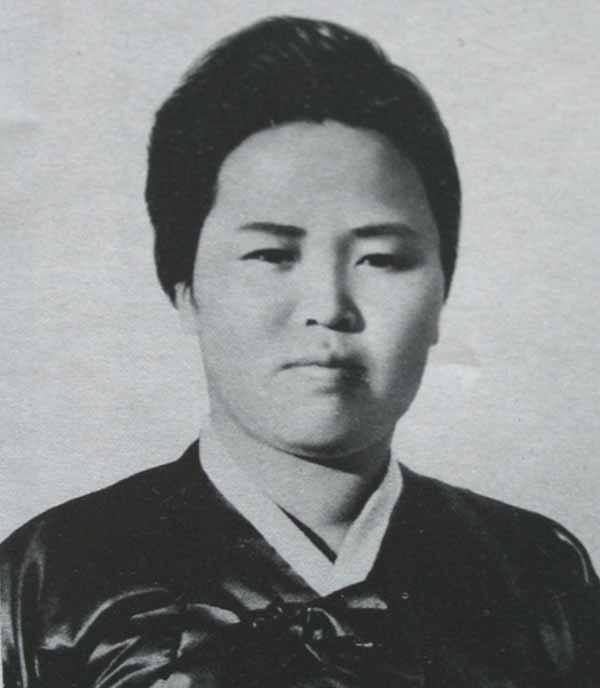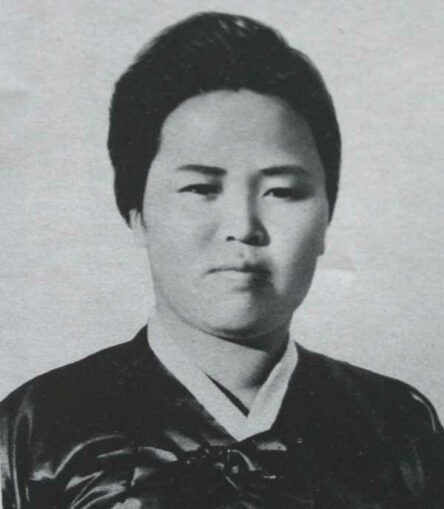

Kim Jong Suk
“My mother passed away too early. Her life, though short, was truly worthwhile.” – Kim Jong II, General Secretary of the Workers’ Party of Korea.


Kim Jong Suk
While love might motivate any child to say this about their parent, never were truer words spoken about any mother. Kim Jong Suk, the first wife of Kim Il Sung and the mother of Kim Jong Il, served the people of Korea — all Korea, including the currently occupied South — in their liberation fight, first against the Japanese Empire and, after World War II, against U.S. imperialism.
Born to peasant parents at the end of 1917, Kim Jong Suk struggled under a semi-feudal society. Instead of being able to play and be a child, she had to fight to aid her family and the families of others under the reigning system of the day. Living in Korea, she saw the need for revolutionary change.
While Kim Jong Suk’s entire life could take up many volumes, and full biographies have been written, the central theme is that she saw firsthand the oppression of both the feudal system and the reign of Japanese imperialism over Korea. This motivated her to join the Young Communist League.
In September of 1935, Kim Jong Suk joined the Korean People’s Revolutionary Army — the predecessor of the current Korean People’s Army in the Democratic People’s Republic of Korea — and served as a fighter for Korea. Her contribution was notable not only because she fought for the people there, but also because the capitalist nations would never allow a woman to serve as a fighter or serve as a high-ranking official in the military. She served as a political agent for the founding leader and first president of modern Korea, Kim Il Sung, whom she married in 1941, and also as a brave warrior and talented shooter.
Establishing herself as both a communist and anti-imperialist, she was among the first to join the Association for the Restoration of the Fatherland. When Kim Il Sung was nominated to be this organization’s leader, she studied the founding documents of this important organization. She understood the necessity of having organized, selfless leadership in the fight for Korea and against Japanese imperialism.
The fight for Korea led the Korean People’s Revolutionary Army into battles in both Korea proper and Manchukuo (Japan-occupied Manchuria, a province of China to Korea’s north). Throughout the war in Asia during World War II, she was there giving her time and energy selflessly to the cause. She even risked her life to a greater degree by entering enemy-controlled areas.
Japan cracked down on Korea’s people after seeing the Korean People’s Revolutionary Army and the Association for the Restoration of the Fatherland’s successes. The Hyesan incident — two different waves of arrests of Korean patriots by Japanese imperialists — highlighted the importance of secrecy and security. Kim Jong Suk helped to train the agents of revolution while maintaining this secrecy while at the Paektusan Secret Camp, the “home base” of the Korean revolution.
Seeing the need for revolutionary change in Korea and the world, in 1937 Kim Jong Suk joined the Communist Party, the predecessor of the Workers’ Party of Korea. The importance of this cannot be exaggerated. Had the Communist Party not fought for Korea’s freedom and won in the north, the entire peninsula could have come under occupation by the United States of America post-World War II. Otherwise, the Koreans would be getting rid of Japanese occupiers only to see them replaced by U.S. occupiers.
Toward the end of World War II, Kim Jong Suk watched over and trained the women guerrillas. She taught them the works of Kim Il Sung and other revolutionaries. She also served as an icon of success in revolutionary activity, constantly studying, teaching and fighting. According to her biography, after the battle at Hongtoushan in 1937, it was noted that she had killed 40 enemy troops.
By the end of World War II, word of the unconditional surrender of Japan reached the ears of Kim Il Sung and Kim Jong Suk, along with the rest of the Korean patriots. They celebrated and triumphantly returned to their homeland after the withdrawal of the defeated Japanese from Manchukuo. They saw what the final defeat of the Axis Powers meant: the freedom of Korea and the countries occupied by the fascist alliance. Kim Jong Suk and her family — including her spouse Kim Il Sung and her son Kim Jong Il — celebrated their victory at Mangyongdae, a neighborhood in the Pyongyang area of Korea.
Even after Japan’s defeat, Kim Il Sung required security as he fought for the Korean nation and people. Kim Jong Suk served as part of his security force, being alert and preparing for the West’s plots against Korea. She also prepared to transform the Korean People’s Revolutionary Army — a guerrilla force that fought for Korea — into the modern Korean People’s Army. She fought, literally and figuratively, for a people’s republic in Korea. After the founding of the Democratic People’s Republic of Korea, she carried out duties as the spouse of the president.
Sadly, after her life of selflessness and struggle, she died of an ectopic pregnancy in 1949. She still serves as a symbol of fortitude and honor for Korean women and women around the world. Kim Il Sung and Kim Jong Il both mourned her loss in their books and documents. This Women’s History Month, we need to remember the women who fought fascism and imperialism.
Sources:
May 19, 2025, will mark the 135th birthday of the great Vietnamese leader Ho Chi…
Philadelphia Honoring the 11 people murdered by the state when they dropped a bomb on…
The centennial of the birth of Malcolm X, also known as El-Hajj Malik El-Shabazz, is…
On May 11, which was Mother’s Day this year in the U.S. and several other…
Philadelphia On Mother’s Day 2025, May 11, Families for Ceasefire Philly and over 20 local…
North Philly Peace Park gathering After a federal court hearing on an anti-immigration bill early…